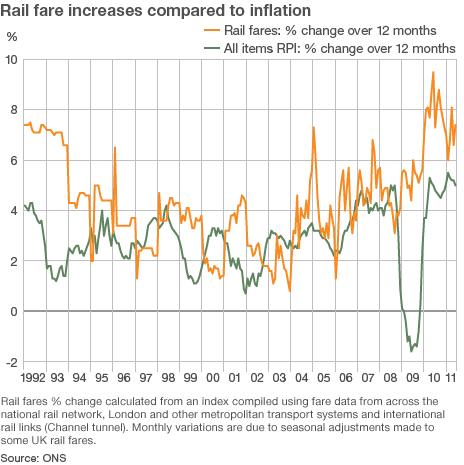Inflation figures to raise rail fares by 8% average
- Published
- comments
Train passengers in Reading give their reaction to the increases
Rail commuters are facing ticket rises of about 8% next year, following the release of July's inflation figures.
Regulated fares, such as season tickets, use formulas based on the RPI figure - unchanged at 5%.
This means the average season ticket in England Wales will rise by about 8%. Some fares might cost more.
Rail Minister Theresa Villiers said "difficult decisions" had been taken due to the budget deficit. Campaigners called the rises "a disaster".
The rises are part of the government's agenda to reduce the cost to the taxpayer of running the rail network.
RPI - the retail price index - is a measure of inflation published monthly by the Office for National Statistics which measures changes in the cost of goods and services.
For the past few years the formula for fare increases has generally been RPI inflation plus 1%, but for the next three years it is RPI plus 3%.
The formula affects regulated fares, such as season tickets and long-distance off-peak tickets. Some fares will go up by far more than the 8% average, because train companies are allowed to increase fares by another 5% on top, as long as that is balanced with reductions elsewhere.
Rail customer watchdog Passenger Focus said having some fares regulated was "clearly in passengers' interests", although the way that train companies were allowed to set prices on individual routes was "deeply unfair".
Its director, David Sidebottom, said: "Some passengers, who may have seen no investment or improvements, can get hit year after year. We will forcefully advocate change to this system in the government's forthcoming fares review.
"The government's commitment that the next three years should signal the end of inflation-plus-3% rises is welcome but in the meantime passengers will have to dig deep."
Edward Welsh, corporate affairs director at the Association of Train Operating Companies (Atoc), said all the extra money raised would go to the government and not train companies.

'Difficult times'
He told BBC Radio 4's Today programme the "good news" was that the money would help to sustain investment in the railway network.
"It's about ensuring that there is money there to pay for improvements for more trains, for better stations, for faster services - and that's what passengers want," he said.
Earlier, an Atoc spokesperson said companies knew these are "difficult financial times for many people".
But he said that many fares needed to rise above inflation for the next three years to help pay for more trains, better stations and faster services.
"Increasing the money raised from fares will mean that taxpayers contribute less to the running of the railways, whilst ensuring that vital investment can continue," the spokesman added.
There are some exceptions to the formula to be adopted the UK next year:
English train companies, including those running into Scotland or Wales such as Virgin or First Great Western, will use RPI+3%
Scotrail will stick to the RPI+1% formula
Merseyrail will use RPI+0%
Arriva Trains Wales is currently using RPI+1%, which applies on its services running in Wales and into England. The Welsh government can choose to modify the settlement for Arriva Trains Wales - its 2012 rate increase is still to be set.
A combination of more people travelling, above-inflation fare rises and cost-cutting has led to rail users' contributions to the railways rising from £5bn in 2006-07 to £6.6bn in 2010-11 - over the same period the amount contributed by taxpayers has fallen £6.3bn to £4bn.
Rail minister Theresa Villiers says the government will deliver "a massive programme of rail upgrades"
Campaigners protested at London's Waterloo station about the price rises.
"Affordable rail travel is vital for passengers, for the environment and for our workforce," said Alexandra Woodsworth from the Campaign for Better Transport.
"These massive fare rises will be a disaster for people already struggling with rising costs, and risk pricing those on lower incomes out of jobs in our major cities.
"The country simply can't afford fare rises on such a punitive scale. It's time to burst the bubble on inflation-busting fare hikes."
But the rail minister said the scale of the deficit meant that the government "has had to take some very difficult decisions on future rail fares but the long-term solution is to get the cost of running the railways down" in order to "get a better deal for passengers and taxpayers".
She added that revenue from fares enabled the government to "continue to deliver much-needed improvements on the rail network, improving conditions for passengers and helping to strengthen economic growth".
- Published16 August 2011
- Published16 August 2011
- Published16 August 2011
- Published10 August 2011